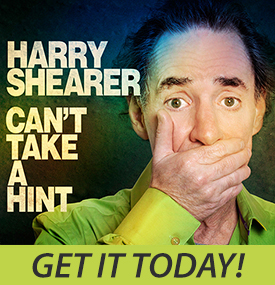Press page 5

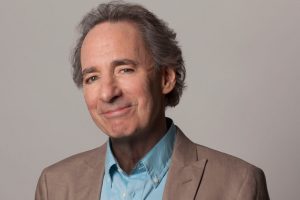
Photo: Dan Dion
Harry Shearer: Songwriter Interview
By Dan MacIntosh
October 24, 2012
Songfacts
“I got into it, obviously, to express comedic stuff. But living with a songwriter, singer, musician of a very high order, I was on notice fairly early on. I don’t know if these were her exact words, but they’re pretty close: ‘It’s okay if you do comedy music, but it better damn well be good music…”
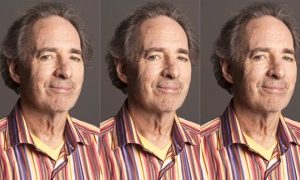
Photo: Dan Dion
Harry Shearer: Spinal Tap? Check. The Simpsons? Check. Grammy Nominated Musician? Double Check.
By Rick Suchow
September 01, 2012
Bass Musician
You’ve seen him play bass on the big screen as Derek Smalls in This Is Spinal Tap and Harry Shubb in A Mighty Wind; you’ve heard his voice on television via a dozen animated characters on The Simpsons. But for the real life version of Harry Shearer, playing bass and using his voice is anything but fictional…
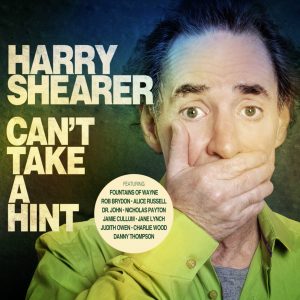
Can’t Take A Hint: A Conversation With Harry Shearer
By Mike Ragogna
August 31, 2012
HUFFPOST
“A lot of my songs happen because I stumble across a phrase that just makes me laugh and I think, ‘Oh, that could be a song.’ And Variety, the soon-to-die trade paper of show business in Hollywood, was reporting on Madonna having reached that stage in her career where she was signing a deal to pitch vodka to, I guess, younger people. The headline said ‘Madonna Joins Ranks of Celebrity Booze Endorsers’ and I didn’t realize that was an organization that had ranks, and that phrase just stuck with me. It made me laugh and then I thought, there’s a song there…”
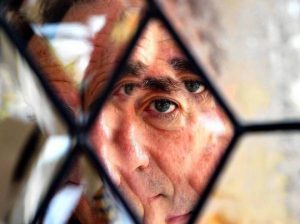
Photo: Genaro Molina
Harry Shearer Is In A Topical Zone With Album ‘Can’t Take A Hint’
By Randy Lewis
August 27, 2012
Los Angeles Times
You can’t blame Harry Shearer for feeling a twinge of regret just before the release of his latest satirical album of topical songs, “Can’t Take a Hint.”
“Pussy Riot and ‘legitimate rape’ in the news in the same week?” Shearer said, his eyes widening in disbelief as he leaned back into a love seat on the enclosed porch of his longtime home near the beach in Santa Monica. “I feel a little cheated.”
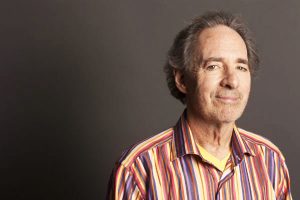
Photo: Dan Dion
Harry Shearer Talks Taboo Topics Like Priests And ‘Deaf Boys’ On New Album: ‘I’m Not Tiptoeing… I’m Walking Straight Into It’ (Q&A)
By Tim Appelo
August 24, 2012
Hollywood Reporter
“Deaf Boys is certainly as close to the line as you can possibly get. When I first wrote the line, ‘Deaf boys can’t hear me coming,’ I thought, come on now. You can’t really do that.’ Oh yes, I can. I think extremely transgressive behavior deserves extremely transgressive ridicule. How can you be nice and write about something so horrible?”

Will Coviello Talks To The Man Whose New Album, Can’t Take A Hint, Is A Mashup Of Comedy And Music
By Will Coviello
August 20, 2012
Best of New Orleans/Gambit
“It’s a song about how dumb a pop song can be and still exist… Just repeat the same thing and have a two-note melody. Simplicity and repetition. And did I mention the simplicity and repetition?”
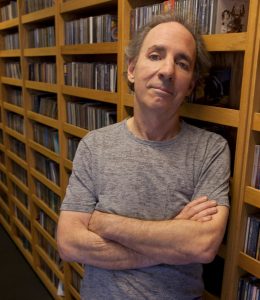
Photo: Dan Dion
Be His Guest: Harry Shearer Taps Some Famous Voices – And Does A Few Himself – For New Album
By Steve Hochman
August 19, 2012
89.3 KPCC
“The amazing part is I sometimes overwrite lyrics,” Shearer says. “Normally I shave them down when I start singing. But the Mac comes in and I realize as he’s singing that there’s much more shaving to be done. And he just does it, intuitively, as he’s singing, the same kind of editing down to the bone that I once saw Rodney Dangerfield doing on his jokes.”

Harry Shearer Takes a Hint
By Tom McDermott
August 01, 2012
OffBeat
Comedians have been effective political commentators ever since Aristophanes used his wit to satirize the foibles of the ancient Greeks. Harry Shearer has a long history as a satirist dating back to his work with the Credibility Gap, Albert Brooks, Fernwood 2Night and the transcendent musical mockumentaries Spinal Tap and
A Mighty Wind. Shearer’s acting career runs the gamut from a childhood part in Abbott and Costello Go to Mars to the clueless anchorman in Godzilla who demands to know what the lead story is as the monster passes behind him. Well-known for his voice roles in the Simpsons and his great radio program Le Show, the Los Angeles-born Shearer has adopted New Orleans as a spiritual home and been a stalwart advocate for the city for years. His documentary The Big Uneasy attempted to raise public awareness of the Army Corps of Engineers’ culpability in the flood that destroyed New Orleans in 2005 following a massive failure of the substandard levee system in the wake of Hurricane Katrina. On August 27, Shearer releases a new album, Can’t Take A Hint, on which he’ll be joined by a variety of guests.
You’re known as a political satirist. How much of your new CD is politically oriented? And please tell us why you chose your duet partners.
All but two of the songs are either culturally or politically satirical. The guests were chosen largely on the basis of being people I know, closely or loosely, who could sing the songs in question far better than I could. The fact that many of them are quite well-known and might help this record break the four- figure sales barrier is just a happy accident, as well as the whole point of the enterprise. All of them, I’m happy to say, were quite agreeable to participation.
“The four-figure sales barrier,” what a sobering summation of our recording biz. Most of our readers would know Jamie Cullum, Tommy Malone and Dr. John, but would you care to give some pithy descriptions of some of your other collaborators?
Jane Lynch is best known from Glee, but I know her from working with her in A Mighty Wind and For Your Consideration. She also did Judith [Owen] and my Christmas show in Los Angeles last year, where I was reminded what a kick-ass singer she is. Fountains of Wayne is one of my favorite rock bands—smart, melodic songs. I guess they’re called “indie.” Rob Brydon is well-known in the UK as a very funny comedian. He was seen this year in the film The Trip as well as a guy blessed with the usual Welsh set of amazing pipes. Charlie Wood is a wicked pianist-singer-songwriter, educated at Tulane University, made a bunch of swell records in Memphis, and is now living in London. Danny Thompson is a legendary British upright bassist who has literally played with everybody from folk to jazz to rock performers in the UK. Alice Russell is a stunning blue-eyed-soul singer from the UK. She’s having sudden success now with her collaboration CD with the English producer Quantic recorded in Cali, Colombia. Judith Owen is well-known to New Orleanians for, among other things, her Christmas shows at the CAC. She’s just released an album of impossibly confessional songs called Some Kind of Comfort. And she’s my wife.
It’s been about a month [we’re talking in mid-June] since the Times-Picayune, or the Sometimes Picayune as you call it, announced its cutbacks. Can you summarize what you’ve written elsewhere about this situation and perhaps add some new thoughts?
I’ve argued, as have others, that given the combination of the highest reader-per-citizen rate of any metro daily in the top 50 cities and the 36 percent of the New Orleans population that is not internet-connected, this is the last city in the world for the New York-based absentee owners to roll out the model they propose. If you believe the critics on the local weekly up there, it hasn’t even worked in Ann Arbor, where it originated. I’ve suggested that there’s no track record of a three-day-a-week newspaper habit being formed anywhere, and newspaper reading is a habit. And I would add to that: Advance Publications—or as I call them, Retreat Publications—says they’ll only print a paper on the three days advertisers most want to advertise. It seems likely that there are months—July and August seem probable—when advertisers least want to be in the glossy pages of the magazines owned by that absentee owner, the New Yorker and Vanity Fair. So why don’t they cease print publication of those magazines in those months? Why don’t we help them by boycotting those publications, about which they clearly care more than they care about the one-time daily in a city they just as clearly do not understand? That’s my rant and I’m sticking to it.
Rant on, sir. Tell us about the BBC series you’re filming in London about the Nixon presidency. Did it somehow grow out of your Hoover musical J. Edgar!?
No, nothing has grown out of J. Edgar! as of yet, except my impatience. Nixon’s the One is a very different kind of work. J. Edgar! is, as my co-author Tom Leopold and I describe it in its subtitle, a musical fantasia on the life of Hoover. The Nixon show is totally factual, based on the White House tapes, but with a difference—no Watergate, no Vietnam, no politics, no break-ins. Just, as I hope I can describe it in the genteel pages of OffBeat, the crazy motherfucker conversations that pepper Nixon’s recorded days in the White House—conversations, occasionally rants, that reveal the real character of the man in all its bizarre configurations. We shoot it as if Nixon hid not just mics but cameras as well in the Oval Office, and every word is taken verbatim from the tapes. Scary and funny is what we intended, and, based on the reactions to the pilot (shown in the UK in May), it’s what we got. And I play Nixon, one of the towering comic characters of the century.
I know you’ve said that for all the work you did on The Big Uneasy, you didn’t feel it changed enough people’s views, or at least the right people’s views. With that in mind, do you foresee any other New Orleans-centric projects? Hearing Le Show broadcast every week is great, but we could use more Harry than that.
Like my friend, Sandy Rosenthal of Levees.org, I spend a remarkable part of every week chasing after people in the national media who use phrases like “natural disaster” or “New Orleans was slammed by a humongous hurricane” in lieu of referring to the failure of the Corps of Engineers’ “hurricane protection system.” Given the failure of my film to penetrate the national understanding of what happened in New Orleans, Sandy and I will be on that beat for quite a while. As to other projects, my interests wander all over the place, and I try to avoid working in the medium that I’ve just finished a project in, since there’s some inevitable wound-licking time that has to take place.

Harry Shearer Enlists Jane Lynch, Dr. John on New Album
By Gary Graff
July 24, 2012
Billboard
Harry Shearer’s politically pointed new album, “Can’t Take a Hint,” is considerably different than anything he’s done before, either on his own or with Spinal Tap and the Folksmen from “A Mighty Wind.”

Photo: Dan Dion
Song Premiere: Harry Shearer’s ‘Celebrity Booze Endorser’ feat. Fountains of Wayne
Veteran satirist releasing new album of comic tunes
By Dan Hyman
June 04, 2012
Rolling Stone
For his new album of satirical music, Harry Shearer took the advice of his record-company partner and wrangled in a host of guests, including Fountains of Wayne. The New York City power pop band join the longtime comedic actor on “Celebrity Booze Endorser,” a track on the 68-year-old’s forthcoming album, Can’t Take a Hint.
“I’m a huge fan of Fountains of Wayne,” Shearer tells Rolling Stone. “I’ve been playing their records on my radio show, I’ve gone to see them live, I’ve gone back backstage.” Shearer was inspired to write “Celebrity Booze Endorser” after listening to some of the band’s older albums. “I thought who better to play on it than Fountains of Wayne,” he says. “And they said, ‘OK!'”
Other guests joining Shearer on Can’t Take a Hint, which is due for release on August 27th, include voodoo-jazz legend Dr. John and Emmy-winning actress Jane Lynch. Dr. John sings on the track “Autumn in New Orleans,” one of only two album cuts Shearer says are “not meant to make people laugh.”
Shearer met the R&B great after approaching him to headline a show surrounding the premiere of The Big Uneasy, the 2010 documentary Shearer directed that explores the effects of Hurricane Katrina upon New Orleans, one of several places the comedian has called home. “He’s such a sweetheart,” Shearer says of Dr. John. “It was an honor to work with him.”
By comparison, Shearer already knew Lynch quite well: the two had worked together on a pair of films (A Mighty Wind and For Your Consideration), so he knew the Glee star could “sing her ass off . . . Jane is such a wonderful person, such a sweet, smart, kind generous person,” he says. As for his take on her recent success? “When you see somebody suddenly after a number of years escalate to stardom, the natural reaction of friends in Hollywood is to say ‘fuck her.’ But nobody thinks anything but ‘Well, at last it happened to somebody who really fucking deserves it!'”
Music is certainly not new to Shearer. The multi-talented performer, who plays a proficient bass and rose to fame thanks to his work on Saturday Night Live and his starring role in the acclaimed mockumentary This Is Spinal Tap (as well as voicing Mr. Burns and Waylon Smithers on The Simpsons), has released several previous albums, two of which have been nominated for Grammys. Making a new album, Shearer says, was something of a joy after having worked on a serious film like The Big Uneasy.
“It was a major relief to let go and just go back to fooling around,” he says.
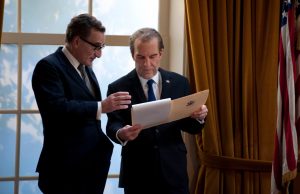
Photo: Ollie Upton
Nixon’s The One, Sky Arts, Preview
By Jasper Rees
April 25, 2012
The Telegraph
The Simpsons’ Harry Shearer tells Jasper Rees about turning Tricky Dicky’s tapes of himself into comedy for Nixon’s the One.
Tom Lehrer didn’t know the half of it. When the Nobel Peace Prize went to Henry Kissinger not long after he had overseen the bombing of Cambodia, the American songsmith famously suggested that political satire was now obsolete. It would be instructive to know what Lehrer, and indeed Kissinger, would make of Nixon’s the One…
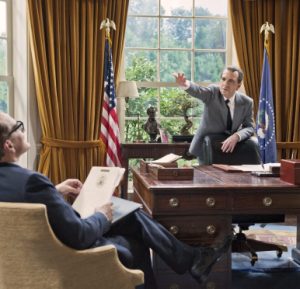
Mr Burns’ Harry Shearer On Playing Richard Nixon
The American satirist takes us into the Oval Office in 1971 and into the life of Tricky Dicky
April 21, 2012
The Times
This week, the American satirist Harry Shearer takes us into the Oval Office in 1971. And though there’s plenty of banter, this is nothing like The West Wing. In what looks like hidden camera footage, we see Henry Kissinger fawn shamelessly to President Nixon. Nixon himself, a man seemingly unafflicted by any desire ever to edit himself, blathers on to dairy industry lobbyists about the “soothing effect” of milk, orders his men to investigate “the rich Jews” who support the Democratic Party, sounds off about blacks, Mexicans, ancient history: “Aristotle was a homo, we all know that. So was Socrates.”
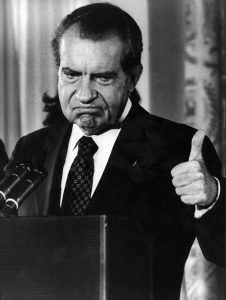
Photo: Arnie Sachs
Harry Shearer Takes His Richard Nixon Comedy Series Across The Pond
By Lisa de Moraes
April 17, 2012
Washington Post
“It’s not about Watergate or Vietnam, but about Nixon as a character,” Shearer said. “There are so many conversations on the tape that are profoundly revealing of what a strangely twisted guy he was…”
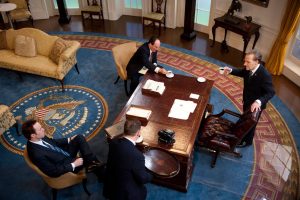
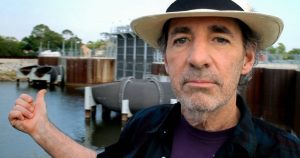
Revisiting Katrina
By Daniel M. Gold
September 23, 2010
The New York Times
By the time Hurricane Katrina passed to the east of New Orleans, it wasn’t a once-in-a-lifetime storm; the city probably experienced…
Previous page PAGE 5 of 5
